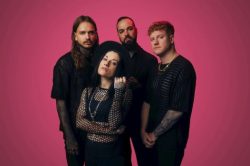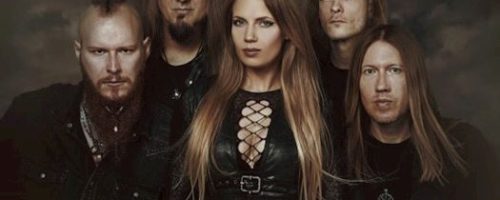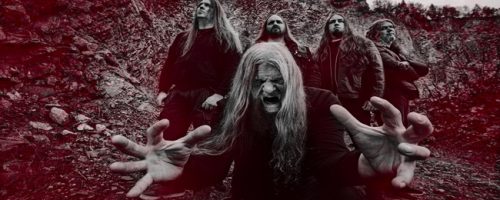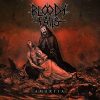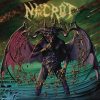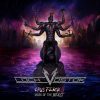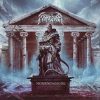Diesel Machine – The Evolution of Aggression
Wednesday, 30th September 2020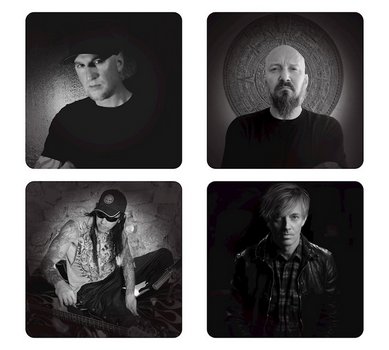
Combining groove-based heavy metal influences, Diesel Machine have finally resurrected after a lengthy absence from the scene. Not that these four musicians haven’t been heard in other projects/bands – chances are if you look through your collections for records from Vinnie Moore to Soil, Yngwie Malmsteen to Damageplan, as well as Halford and others you’ll hear the work of vocalist AJ Cavalier, guitarist Patrick Lachman, bassist Rich Gonzales, and drummer Shane Gaalaas. Evolve as the second studio record for Diesel Machine contains all the aggressive riffs and slamming grooves plus ripping vocals you’d expect from the genre – especially if you are into acts like Crowbar, Machine Head, and Pantera.
We reached out to drummer Shane from his California base to learn more about the man’s musical history, how Diesel Machine finally came back on the scene, future plans, plus his meditation practices and some killer memories relating to the Vinnie Moore record The Maze.
Dead Rhetoric: What are your memories related to music like from childhood – and how did you develop an interest in heavy music and eventually wanting to pick up instruments and play in bands?
Shane Gaalaas: A lot of stuff there. For me, the whole music thing started for me when I was a child. My parents listened to a lot of 50’s rock and roll – Elvis, Chuck Berry, Little Richard. At that point, I started to become curious as to how they made that music, what were the instruments that were playing throughout that stuff. As I got a little bit older, my father played piano and I would pay attention to what he was playing, and I noticed there was a correlation between what he was playing on the piano and what I would hear in the music. I put the stuff together – and then my mother was instrumental in showing me how the drums actually broke down in the music, which voices played a role in the music I was hearing. She taught me how to play a basic back beat, the eighth notes on the hi-hat, where the kick drum was, snare drum on the two and four.
I progressed into different music like the Beatles, my grandmother gave me John Lennon’s solo record as my first record. That went on for a few years until the Kiss thing. I heard “100,000 Years” from Kiss Alive I, and I needed to figure out the drum solo on that. This is what I want to do. I begged my parents to get a drum set, I saw Kiss in concert, and then got a guitar and learned how to play both. That’s how it all worked, me getting interested in the music.
Dead Rhetoric: Evolve is the latest Diesel Machine album – twenty years after the release of your debut full-length Torture Test. Can you tell us the circumstances that found you guys coming back together, and where you see the major differences in this release from that debut?
Gaalaas: I don’t know that we ever really sort of broke up or anything. The progression of everyone’s lives and the circumstances within our lives – during Torture Test, we released the record, we went on tour with Static-X and Soulfly, started to play around town a lot and get a buzz. And then we all got into different bands by default- when a big artist needs you to tour for a couple of months, you kind of take the gig when you are a struggling musician like we all were here in Los Angeles. Patrick went to Halford at that point, I got a gig in Japan with this band called B’z, AJ was in a band called Soil, and that summer of 2002 unfortunately our bass player Rich Gonzales was in a really bad motorcycle accident which left him in a coma for a while. That was the thing that threw a wrench into the Diesel Machine plan to continue to write, tour, and all that stuff.
It took a while for Rich to get back, but it was a challenging time for him in rehab. We had all started playing in different bands – and when we would have a break we needed all three guys to have the schedules line up. Patrick and I got together on a couple of different occasions and we would toss around ideas, we had a lot of stuff pre-written. You take that situation, and it’s easy for time to go by. Over the last eighteen years, it took this long to make it happen. Rich is playing in other bands too. It was a challenge to get us all together to finish it off. It went on and on, but we didn’t plan for this to take this long. Then getting it over the hump and finding a place to live (on a label), that was another challenge in and of itself.
Dead Rhetoric: Working on this material over three different sessions in your studio, do you believe this gave the band enough time to refine and hone specific songs and performances just the way you wanted – compared to the previous era when you were under the gun by the hour for studio time?
Gaalaas: Yes. We have always recorded onto ourselves. Torture Test the first record, it was recorded basically in our rehearsal space. We created that on our own time, we weren’t under the gun by a label. We play by our rules, and we finished it when we felt like it was done. The same goes for this record. We went through a lot of transitions, experimenting with a lot of different arrangements, changing it, scraping it, re-recording. I think it’s beneficial for us as a band to be able to do it this way, take our time and really hone it to the way we want it.
On the other side of the coin, it took forever.
Dead Rhetoric: How do you approach your drumming in Diesel Machine compared to your previous work with acts like Artension, Vinnie Moore, and Yngwie Malmsteen from your past? Do you maintain a balance between throwing in your proficiency and technical skills against serving the needs of the songs at hand?
Gaalaas: I think it’s ultimately always the same – how do you serve the needs of the song? I don’t go in with the intention to think how do I make this the raddest drum song in the world? How do I support the song – the grooves, the vocal, how do I make the sections change and transition properly. Inevitably there will be my own little spice that comes into certain sections and brings things a little more drummy, playing off Patrick’s guitar riffs. It can start from the writing standpoint, and then Pat jumps in to play off some syncopated pattern. That’s when you will have a syncopated sounding groove. It may start out all busy, but we trim off a lot of fat to make the important parts of a song really great. It’s balancing that, the technical thing with making a great song.
We aren’t really a prog band – I’ve been in other situations where it’s like making parts rip and crazy, putting together a bunch of parts. It’s a band and we are making songs, the band comes from a groove standpoint.
Dead Rhetoric: Do you believe you are at an advantage because of the fact that you play multiple instruments and your perspective as a drummer, you look at things from all sides?
Gaalaas: I think yes and no. Being in the guitar player chair at points in my life where I had a drummer, it seems like I notice that when I was drumming I was focusing a lot on what I was doing. When I was able to step out, play guitar, and have a drummer play my song, it’s like the pendulum sort of swings. I wish you would play that simple – no need for all the fills and ghost notes, just give me a two and four on the snare and groove. That tweaked my head a little bit. I think it helps me to focus on the song, and understand from another perspective what it is that makes the song feel good, rather than just the drum part.
Dead Rhetoric: How important do you believe band chemistry and friendships are at this point in your career? Especially considering the numerous changes and evolution of the music industry that currently exists today?
Gaalaas: That’s key, right? Bottom line, you have to have the chemistry and friendships first if you are going to have a successful thing. That’s paramount and the most important ingredient, how you gel together and how you get along. If you don’t have that, it won’t work for no twenty years, that’s for sure.
Dead Rhetoric: What would you say have been some of the more important lessons that you’ve learned as a working musician over the years that maybe younger players don’t take into account?
Gaalaas: Depending on the situation you are in. If you are a session musician, I think you have to be very aware of pleasing the artist and understanding, trying to give the artist what he or she wants and that requires setting your ego aside. We internalize these things we are very proud of, and are attached to stylistically – maybe our vocabulary on the instrument. We really want to express that every time we play, and if you are in a side man situation, the artist doesn’t want your vocabulary all over his music.
You really learn how to support the artist and support what they say, and are open to suggestions that they want. If you can’t do that, it’s not going to work being a hired gun. Save all your stuff for your solo record.
Dead Rhetoric: What attracted you most to this style of punishing metal, where acts like Pantera, Machine Head, and Crowbar established themselves due to their original outlook?
Gaalaas: I was always attracted to going back as far as I can remember, the organic thing, aggression, you hear when you have raw drums playing. It’s in our DNA to want to beat on drums and make rhythm. I always loved heavy music – the Maiden’s and Priest’s, a wide range of music. I always loved aggressive sounding stuff, the first Metallica record, Anvil, then Pantera, Meshuggah. I’ve always been attracted to this music – it really gets me going, fires me up and inspired me on the drums as well.
Dead Rhetoric: How has the coronavirus pandemic changed your perspective and outlook on life – especially as a musician?
Gaalaas: Um, I don’t know. I’m still trying to figure that out myself. We are all scrambling to what’s going to happen. It’s a challenging time for musicians – we’ve never been through this before, in the history of music as far as I can remember. In this century for sure. We are in limbo waiting to see the dust settling and how we are going to pick up the pieces. All the festivals, tours, and shows got cancelled. And now we are writing at home, doing collaborations and it’s all fun – but there is going to come a time where we are going to have to get out and play again, because it’s the way we make our living.
It’s made me more aware of how fragile we are as a species on this Earth. We had no idea this was coming, and it shut down the world. There’s definitely a new awareness of how fragile this place is.
Dead Rhetoric: What do you believe your Canadian upbringing brought to the table as far as work ethic and abilities when you moved to California to become more of a working musician?
Gaalaas: Hockey rules – explaining all the rules of hockey to my American friends? No (laughs). We are all just human, and geographically I ended up just growing up in Canada. I was probably exposed to some different music that maybe wasn’t heard in other parts of the world. I don’t think it makes that much of a difference where you come from, at the end of the day you are speaking the language of music. We all have that similar bond when we are playing. I can deal with the cold when we tour- actually I shouldn’t say that as I’ve lived in California now for too long. I adapt quickly to it, we spend a lot of time in cold climates. We spent a lot of time jamming too, growing up in Canada, those long winter days – I would have been out on my BMX bike or skateboard if I lived in California, but in Canada we spent a lot of time playing in basements. I learned how to communicate with people in a jam sense, how to arrange songs, that process seems to be natural now. I notice in situations where I write, I can see it as challenging, but it helped on some level. When you spend times in the winter writing with your friends all those months as a teenager, it gave me more awareness how to respond and react in a writing situation.
Dead Rhetoric: What is your mindset in the studio versus live performances – and do you believe you are continually learning, growing, and evolving at your craft?
Gaalaas: It’s two different animals. Live, it’s a collective thing that you are sharing with the audience. It’s going back and forth synergy amongst the band. It’s almost like a sporting event, especially if it’s a rock and roll show. It’s like you are playing a game, and you try to win that game every time. Sometimes you don’t – you’ll have a good first period, or second period, or might get a couple of goals. As long as you come out the third period and win the game then or in overtime, to use a hockey analogy, you feel good. Whereas in the studio, as a drummer I’m playing lighter, more controlled and relaxed. I’m listening to the music more on a deeper level. Where when you play live, you know the songs and go out on auto pilot, slam out through the show. If you are a jazz setting, that’s another animal where you are interacting and speaking with the band.
Dead Rhetoric: When you look back at your career, what do you consider some of the highlights as far as records, live shows, etc.?
Gaalaas: Oh wow. There are so many. I don’t know where to start. There are key live shows you’ll remember forever. The first time I played Budokan in Japan with Yngwie Malmsteen. Last year I was out with Slash, a couple of good shows. The first time I played a stadium show in Japan with B’z, that stands out. And a few performances where I was playing in a jazz setting at the Baked Potato that I remember having a deep impact. The records, a select few that feel very special. There are a lot of things that I remember, I could make a long list of them.
Dead Rhetoric: When I was doing research on your vast discography, I was listening to Vinnie Moore’s The Maze album, and your work was outstanding there…
Gaalaas: Thanks. The Maze, that was a tough and challenging record. Probably the most difficult record I ever made. The reason for that was… initially Deen Castronovo was the drummer who was supposed to play on that – for whatever reason, he couldn’t make that session so Mike Varney called me a couple of days before the session and asked me to fly up and rehearse to learn Vinnie’s stuff and record on Saturday. I wanted to say to record the drum tracks over one day and night. I think I got up there Thursday night, and then Friday I spent rehearsing with Vinnie Moore and Tony MacAlpine in a barn and charting out all the music that night. The next day I had to be in the studio at 10 am, back in those analog days it took a long time. You are moving in drums, setting them up and recording to ADAT’s and tape. Soundcheck with the drums took at least two or three hours, getting the tones all dialed in. We started tracking around one o’clock in the afternoon, and we worked all day long and played until four or five in the morning tracking that record.
I flew by the seat of my pants, luckily I could read to make the charts. It was challenging, there were points in the studio where I was throwing sticks at the walls because I couldn’t get the take. In those days, you had to do the whole take in one shot, time restraints and no editing where you could move things around on a fill or something. It was hard, but I haven’t listened to that record in a while. I didn’t listen to it because I was scared of what I may hear. It was a lot of great music on that record. Vinnie was such a cool cat, and we toured with that record quite a bit. That was a lot of fun.
Dead Rhetoric: Can you discuss your meditation practice and how the power of mindfulness has improved your outlook on life?
Gaalaas: Sure. I got into pseudo-meditation around three years ago when I was in Japan. I’m by no means enlightened on any level, but Sam Harris had come out with a great app called Waking Up. It’s to calm down the monkey mind, I can get kind of crazy thinking of things that aren’t relevant. It’s great to happen now, it’s helped me with my focus and I can get a lot more accomplished in my life. That was a challenge for me growing up, I highly recommend everyone getting into a meditation practice. I used to think it was a ‘woo-woo’ thing, and that you had to go on a guru retreat. It’s not like that at all, it’s basically calming the mind, it’s more about listening to my breath and try to not think about anything. Sometimes you can do it for a minute, or a couple of minutes, and I’m not a pro to block out for an hour. I try to do it in 10 or 20-minute increments. It carries over into the rest of my day. When I am searching for a way to shut everything off, I can do that a lot easier now and know what it feels like to shut off the mind. It carries over into the rest of your day.
Dead Rhetoric: What does the next twelve to eighteen months look like for Diesel Machine and you personally as far as promotion, recordings, performances, etc.?
Gaalaas: The record will come out, and I hope COVID goes away. I don’t know, I wish I knew what would happen. What are shows going to look like? Limited capacity, probably. But everyone would be spaced apart, I don’t know how it’s going to roll. We hope to get onto a tour, maybe write some new stuff, and put out another single by the end of the year. If all things fall into place, really fast, that would be a great scenario. Promote the product, I’m grateful for you to get me on here to spread the word.











